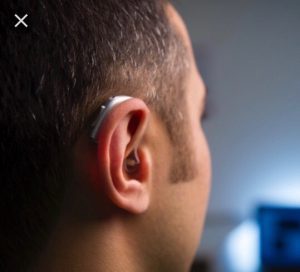June 21, 2018, by Mel Ferguson
NICE: new Guidelines on Hearing Loss
This month we have two blogs on our Mild to Moderate Hearing Loss (MMHL) research at the NIHR Nottingham Biomedical Research Centre. One on the impact of hearing loss, as well as this one to coincide with the publication today of the ‘NICE guideline on Hearing loss in adults: assessment and management’. These evidence-based guidelines are likely to have an impact on hearing healthcare in the NHS in England.
What is NICE?
The National Institute for Health and Care Excellence, or NICE, provides guidance to improve health and care. NICE does this by providing advice and guidance on health conditions for the public and health and social care practitioners based on the existing evidence. The guidelines come in a short version with just the recommendations, as well as the full version.
 The NICE Guideline Development Committee for Hearing Loss
The NICE Guideline Development Committee for Hearing Loss
In the spring of 2016, a NICE Guideline Committee along with the NICE technical team started work on developing a guideline for hearing loss in adults. The committee included healthcare professionals from audiology, ENT and audiovestibular practice as well as gerontology, GPs, researchers, and importantly, lay members who live with hearing loss. From the Nottingham Hearing Sciences group, Mel Ferguson was a full member (healthcare professional) of the committee, and Pádraig Kitterick and Michael Akeroyd were co-opted to give evidence to the committee.
Guideline Recommendations
The guideline makes recommendations on clinical aspects across the adult patient pathways from referral, assessment, management and follow-up. Some of the research that the MMHL team has carried out informs or is relevant to some of the recommendations.
Hearing aids
 The Cochrane Review on ‘Hearing Aids for Mild to Moderate Hearing Loss in Adults’ addressed the clinical question on the effectiveness of hearing aids. The review included 5 randomised controlled trials (RCTs), the highest level of study evidence, and showed that hearing aids were effective. Hearing aids were shown to offer large beneficial effects for listening ability and hearing-related quality of life, such as participation and conversing with others, and for the first time, beneficial effects for overall quality of life. A health-economic analysis showed that hearing aids were also cost-effective. This led to the recommendation “Offer hearing aids to adults whose hearing loss affects their ability to communicate and hear…” (recommendation 1.6.1; pg 207, full guideline).
The Cochrane Review on ‘Hearing Aids for Mild to Moderate Hearing Loss in Adults’ addressed the clinical question on the effectiveness of hearing aids. The review included 5 randomised controlled trials (RCTs), the highest level of study evidence, and showed that hearing aids were effective. Hearing aids were shown to offer large beneficial effects for listening ability and hearing-related quality of life, such as participation and conversing with others, and for the first time, beneficial effects for overall quality of life. A health-economic analysis showed that hearing aids were also cost-effective. This led to the recommendation “Offer hearing aids to adults whose hearing loss affects their ability to communicate and hear…” (recommendation 1.6.1; pg 207, full guideline).
‘Offer’ indicates a strong recommendation. This should provide clinical commissioning groups who fund NHS hearing aids with the guidance they need for decision-making on hearing aids for people with mild to moderate hearing loss.
Motivational engagement
Another study the MMHL team carried out, which assessed the benefits of motivational engagement using the Ida Institute motivational tools, was also used to inform the guidelines. Here, the guidelines recommend “Consider using motivational interviewing or engagement strategies and goal setting when discussing hearing aids with adults for the first time to encourage acceptance and use of hearing aids”. (recommendation 1.6.3; pg. 256, full guideline).
Patient information
The randomised controlled trial (RCT) on multimedia patient information (C2Hear Online) was not included because for this particular review the included evidence used only qualitative studies. However, there are a number of recommendations relating to information for hearing aid users where C2Hear Online can provide the relevant information. These are to do with how hearing loss is managed, and how to get used to, care for, and troubleshoot problems with hearing aids as well as providing information on assistive listening devices. C2Hear Online is also included in the guidelines’ Patient Information.

Research to practice
And finally… the longer-term goal of our research is to impact on clinical practice in order to benefit patients. Here are some examples of just that. It’s part of what we do, and it is good to see our research informing clinical practice.
Disclaimer: The Hearing loss guideline was developed by the National Guideline Centre which received funding from the National Institute for Health and Care Excellence. The views expressed in this publication are those of the author and not necessarily those of NICE.
Dr Mel Ferguson, Research Lead, NIHR Nottingham Biomedical Research Centre

No comments yet, fill out a comment to be the first

Leave a Reply